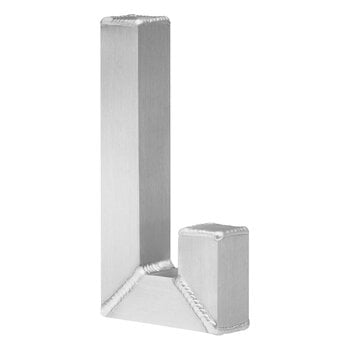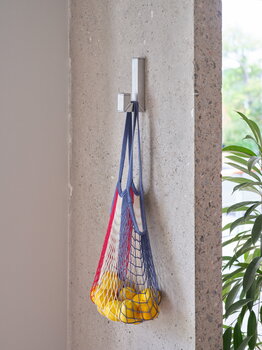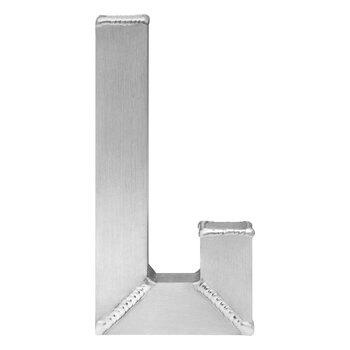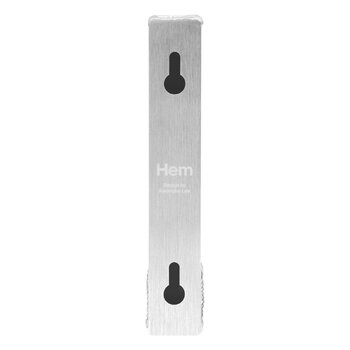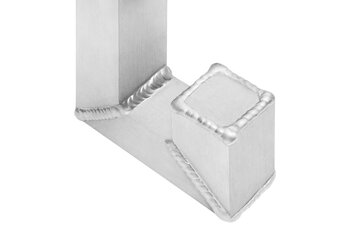Hem's Tig Hook elevates your hallway or dressing room with a hint of contemporary design and industrial charm. The robust wall hook is made of anodized aluminium, which unexpectedly displays the decorative details left by the weld marks. Usually, these kinds of elements are meant to be concealed, but designer Kwangho Lee wanted to emphasise the beauty of the ordinarily hidden. The Tig Hook works perfectly as a single piece or as a row of several wall hooks.
Tig Hook, single, brushed aluminium
Hem
Description
Hem's Tig Hook elevates your hallway or dressing room with a hint of contemporary design and industrial charm. The robust wall hook is made of anodized aluminium, which unexpectedly displays the decorative details left by the weld marks. Usually, these kinds of elements are meant to be concealed, but designer Kwangho Lee wanted to emphasise the beauty of the ordinarily hidden. The Tig Hook works perfectly as a single piece or as a row of several wall hooks.
Product details (7)
- Material
- Anodized aluminium (91% recycled)
- Colour
- Silver
- Width
- 3 cm
- Depth
- 9 cm
- Height
- 18 cm
- Weight
- 0.2 kg
- Care instructions
-
Always test a small area before cleaning. Wipe with a clean and dry or
damp cloth. Do not use any abrasive or chemical cleaning products.
- Product ID
Designer
Kwangho Lee (born 1981) is a Korean designer who graduated from Hongik University in Seoul in 2017, majoring in Metal Art and Design. Kwangho Lee became a designer inspired by his grandfather, who was a farmer by profession, but often crafted various everyday objects from natural materials. Motivated by his grandfather's way of appreciating ordinary objects, Kwangho Lee strives to see even the most mundane objects in a new way and often combines different materials in his work to achieve a fresh perspective on them. Kwangho Lee lives and works in Seoul.
View all productsReviews (0)
Sustainability
The Product Sustainability Framework, our criteria of sustainable design, helps you find the most sustainable products in our selection. Read below which sustainability criteria this product has met.
Working conditions & labour 8/9
-
Equal opportunities for all employees
-
Commitment to UN Global Compact, fair compensation for all employees
-
Corporate responsibility requirements defined and communicated for suppliers
-
Systematic work for improved inclusion and well-being in the workplace
-
Transparent supply chain
-
Suppliers' compliance to a code of conduct ensured
-
Compliance to the UN Guiding Principles on Business and Human Rights ensured in the supply chain
-
Support for community involvement in the supply chain
-
Direct suppliers audited and certified
Eco-friendly production 8/9
-
Fair and resource-wise water-use in production
-
No incineration or landfilling of returned items
-
No use of endangered species as materials
-
No direct environmental emissions or waste (excl. GHGs) from production
-
The sustainability of direct suppliers' production is addressed and monitored
-
Production and material sourcing that respect biodiversity, animal rights, and natural ecosystems
-
Material-efficient and ecological packaging
-
No potentially harmful chemicals used in own production
-
Positive impact on nature’s well-being through operations that regenerate natural ecosystems
Climate impact 4/8
-
Company's direct greenhouse gas emissions identified and commitment to reduction
-
Product's carbon impact identified and commitment to reduction
-
Guidance on energy- and eco-efficient use of the product
-
100 % renewable energy in own production and operations
-
Contribution to climate initiatives beyond the brand’s direct operations
-
Low-carbon or compensated transportation
-
Carbon footprint of the product calculated and goals set to reduce it
-
Carbon neutral or carbon negative product
Sustainable materials 5/6
-
Sustainable and long-lasting material choices
-
No harmful or hazardous substances
-
Responsible raw material sourcing and production
-
Materials suited for circularity: monomaterials, recyclable finishings, renewable or recycled contents etc.
-
Ecological materials: natural, biodegradable, recyclable or recycled contents
-
Outstanding materials in terms of innovativeness, responsibility, sustainability and circularity: local production or sourcing, 100 % recycled content, C2C-certification etc.
Circular design 3/5
-
High aesthetic quality promoting long-term use of the product
-
Design for enduring life-long quality
-
Design and support for product maintenance, repair and upgradability
-
Technically durable product design and material choices
-
Innovative circular design solutions: circular service system, resale platform, remanufacturing, collection of used products, etc.
